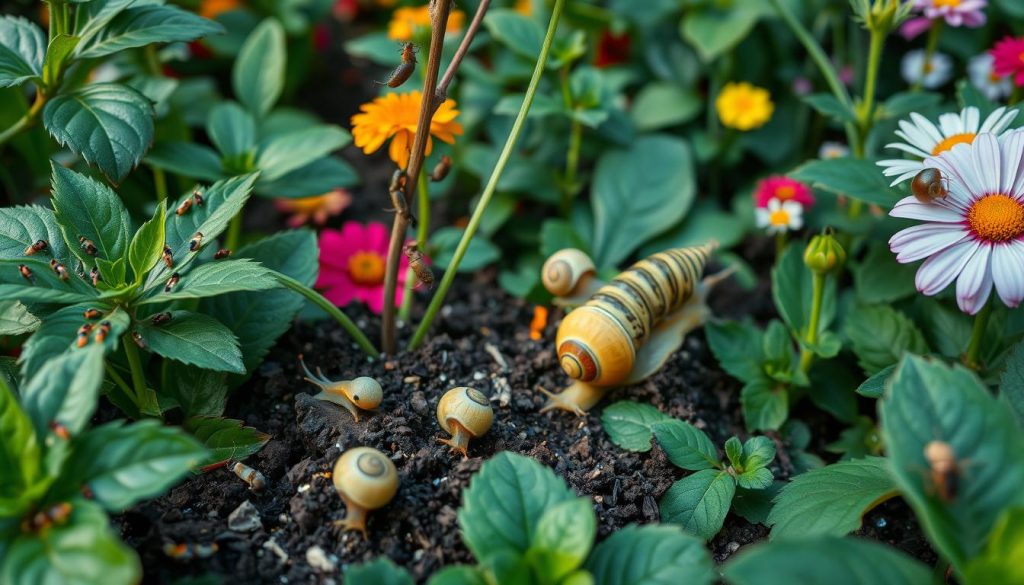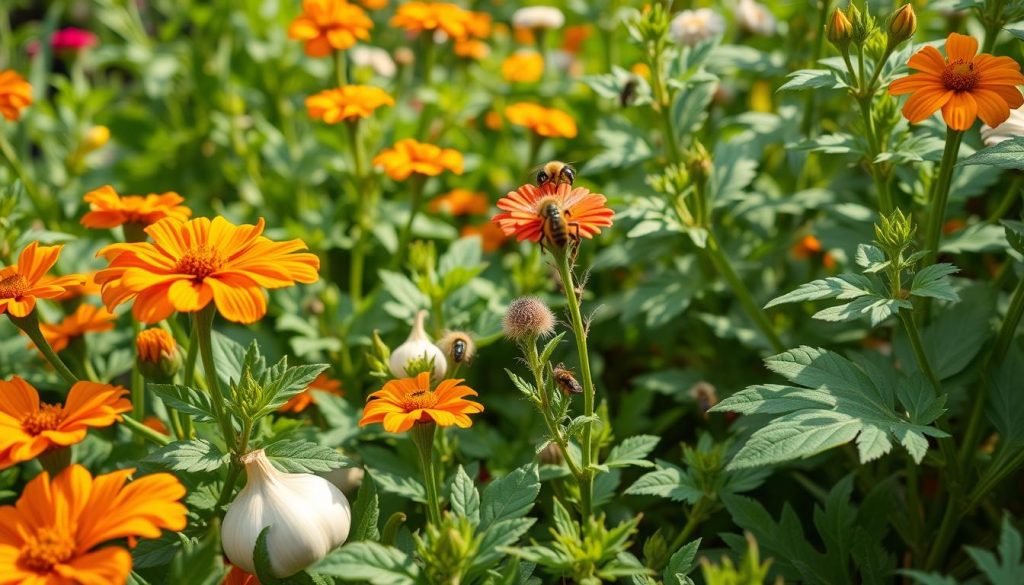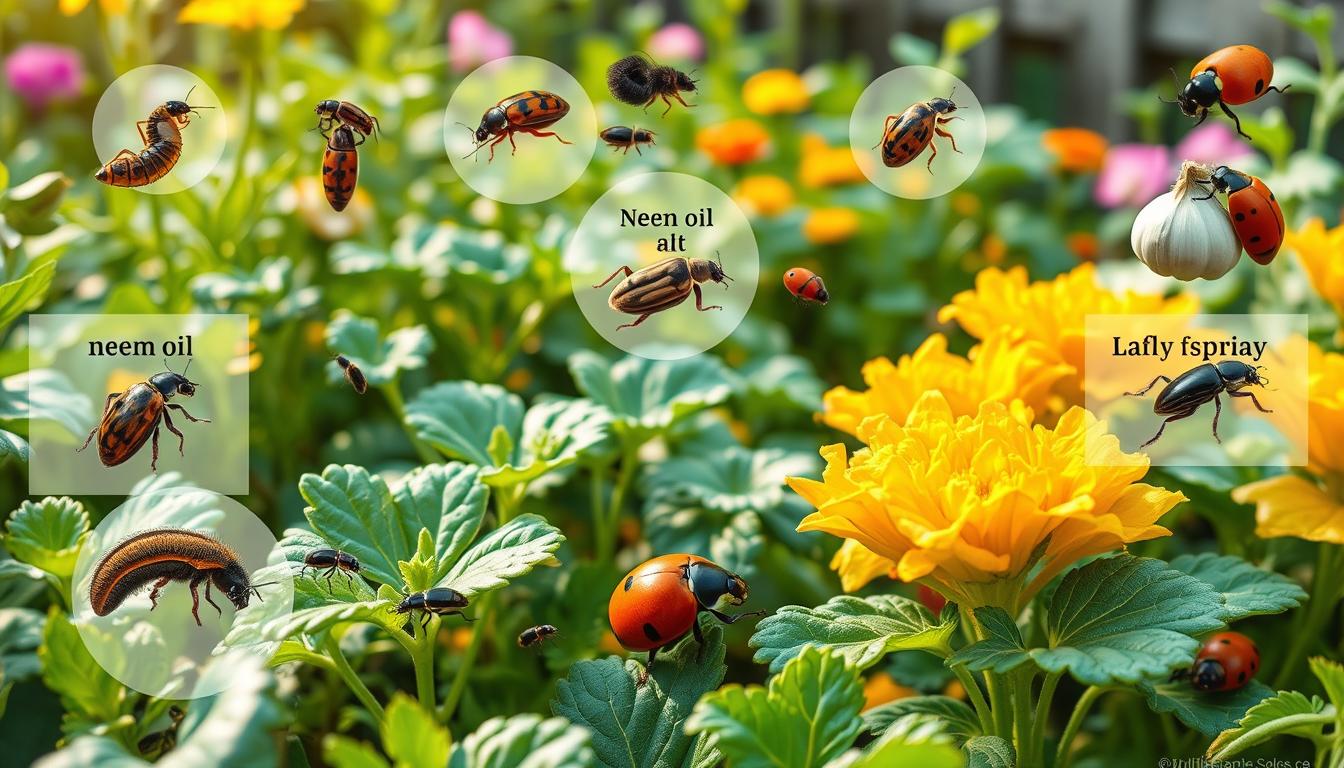As a gardener, I’ve faced many pests like aphids and whiteflies. I’ve found that controlling pests is key to a healthy garden. In this article, I’ll share my effective solutions to fight these pests and balance your garden’s ecosystem.
I’ll talk about understanding pests, their impact on plants, and natural pest control. You’ll get the knowledge and tools to manage your garden. This way, you can enjoy a full harvest while keeping your garden balanced.
I aim to give you a detailed guide on controlling garden pests naturally. This will help you overcome common pests and create a thriving garden. You’ll enjoy the fruits of your labor and the joy of gardening.
Understanding Common Garden Pests
To tackle garden pests, knowing the common insects and how to identify them is key. It’s important to understand the most common pests and their effects on plants.
Identifying the Most Prevalent Pests
Aphids, whiteflies, and spider mites are common pests. They can harm plants, leading to curled leaves and lower yields. Knowing how to identify these pests is crucial for effective management.
Recognizing the Damage They Cause
These pests can cause a lot of harm. Aphids can spread plant viruses, while whiteflies make leaves turn yellow. Spider mites create webs that block sunlight, hurting plant growth. Understanding their damage helps gardeners prevent and manage infestations.
Here is a list of common garden pests and their effects:
- Aphids: transmit plant viruses, cause curled leaves
- Whiteflies: cause yellowing leaves, transmit diseases
- Spider mites: cause fine webbing, reduce photosynthesis

The Impact of Garden Pests on Your Plants
Garden pests can harm your plants’ health and growth. As a gardener, knowing how pests affect your plants is key. Pests can eat leaves, stems, and roots, causing plants to grow less and yield less. It’s important to prevent pests to keep your plants healthy.
To make your garden pest-free, choose plants that resist pests and use natural pest control. This means using beneficial insects and keeping your garden clean. By doing these things, you can keep pests away and have a healthy garden. Some good ways to prevent pests include:
- Inspecting plants regularly for signs of infestation
- Using physical barriers to protect plants
- Practicing good garden hygiene, such as removing weeds and debris
Understanding pests and taking action can make your garden strong against pests and diseases. Use natural pest control, pick pest-resistant plants, and prevent pests effectively. A healthy garden is a balanced ecosystem. By working with nature, you can have a thriving garden.

Natural Remedies for Pest Control
As a gardener, I’ve found that natural remedies are key to controlling pests. By making my garden a healthy place, I don’t need to use harsh chemicals. This way, I help the environment and keep pests away.
I use beneficial insects like ladybugs and lacewings to fight pests. These natural helpers are crucial for a balanced garden. I also use natural pest control methods like neem oil and diatomaceous earth. These are safe for the planet and work well with beneficial insects.

- Companion planting: Certain plants, such as marigolds and basil, can repel pests and improve the overall health of the garden.
- Physical barriers: Using fine mesh or fine netting to cover plants can prevent pests from reaching them.
- Organic pesticides: Insecticidal soap and horticultural oil are gentle on the environment and can be used to control infestations.
By using these natural methods, I’ve made my garden a better place. It’s now more resilient against pests and healthier overall.
Chemical Solutions to Common Pest Problems
As a gardener, I know how crucial it is to control garden pests. Sometimes, natural remedies aren’t enough. That’s when chemical solutions come into play. It’s important to use these chemicals wisely and follow the instructions.
When to Use Chemical Treatments
Chemical treatments should be a last resort. They’re needed when other methods fail and the problem is severe. It’s key to know the pest type and choose the right chemical. Aphids, whiteflies, and spider mites often need chemical help.

Safety Precautions to Consider
When using chemical pesticides, safety is paramount. Here are some steps to take:
- Wear protective gear like gloves and a mask
- Always read and follow the instructions
- Don’t spray during the hottest part of the day or when it’s windy
- Keep pets and kids away from treated areas
By using chemicals responsibly and with other green methods, you can manage pests effectively. This way, your garden stays healthy and balanced.
Effective Traps and Barriers
Dealing with garden pests requires a detailed plan. This includes knowing the common insects in your garden and how to manage them. DIY traps and barriers are effective tools for pest control.
Sticky traps and pitfall traps can catch pests like aphids and whiteflies. They are simple to make and can be placed in key spots in your garden. Physical barriers, such as fine mesh and row covers, also protect plants from pests. This makes it easier to manage garden pests.
- Row covers: These can be used to cover entire plants or beds, preventing pests from reaching them.
- Copper tape: This can be used to deter slugs and snails, which don’t like to cross over copper.
- Physical barriers: These can be used to block pests from reaching plants, such as fine mesh or fine netting.
Using these traps and barriers can help reduce pests in your garden. This makes your garden healthier and more productive. It also makes it easier to identify and manage common garden pests.
Companion Planting Strategies
To keep pests away, consider companion planting. This method pairs different plants to boost growth and fight pests. By picking the right plants, your garden becomes more diverse and strong. This is key for keeping pests away without harming the environment.
Some plants, like marigolds and basil, naturally keep pests away. They’re perfect for planting together. These plants help lower pest numbers, cutting down on the need for harmful chemicals. Here are some good plants for companion planting:
- Marigolds, which repel nematodes and other pests
- Basil, which repels aphids and other flying insects
- Chives, which repel aphids and other pests
Adding these plants to your garden helps create a balanced ecosystem. It promotes healthy growth and lowers pest risks. This method is not only effective but also eco-friendly. It’s a great choice for those who want to protect their garden without harming the environment.
Cultural Practices for Pest Management
As a gardener, I’ve found that cultural practices are key in managing pests. Simple techniques can lower pest numbers and make your garden healthier. Crop rotation is a powerful method. It involves changing crops to break pests’ life cycles.
Timing your planting is also vital. Planting at the right times can avoid pests. For instance, marigolds in spring can keep nematodes away from tomatoes. Introducing beneficial insects is another natural way to control pests.
- Rotating crops every season to avoid depleting the soil of specific nutrients
- Using physical barriers, such as fine mesh, to prevent pests from reaching plants
- Keeping the garden clean and free of debris, which can attract pests
By using these practices, you can cut down on chemical pesticides. This approach makes your garden more balanced. It helps your plants grow well and keeps pests at bay.
Seasonal Pest Management Tips
To keep your garden healthy and productive, it’s key to manage pests seasonally. As a gardener, I’ve found that controlling pests is vital all year round. Using natural methods can greatly help. Here, I’ll share tips for spring and fall to keep pests away, focusing on eco-friendly solutions.
In spring, I cover my plants with row covers to stop aphids and whiteflies. I also use neem oil to fight off diseases and pests. These steps are part of my strategy to keep pests out and ensure a healthy garden.
Spring Strategies for Early Infestations
- Use row covers to prevent pests from reaching your plants
- Apply neem oil to control fungal diseases and pests
- Inspect your plants regularly for signs of infestation
In fall, I get my garden ready for next year by cleaning up and using diatomaceous earth. These steps are crucial for a pest-free garden. By following these seasonal tips, I keep pests at bay and ensure a strong garden.
Fall Preparations to Reduce Pests
- Clean up debris to prevent pests from overwintering
- Apply diatomaceous earth to reduce pest populations
- Plan your garden layout to minimize pest infestations
Monitoring and Maintenance
Regular inspections are key to managing garden pests. By keeping an eye on your garden, you can spot common insects early. This helps prevent them from causing big problems.
Early detection is crucial when dealing with pests. Catching them early stops them from spreading. This method protects your plants and keeps your garden healthy.
Regular Inspections That Make a Difference
To inspect effectively, know what to look for. Check for pests like aphids, whiteflies, and spider mites. Also, watch for damage like holes in leaves or discoloration.
Being proactive and identifying pests early can prevent infestations. This keeps your garden balanced and healthy.
Keeping a Pest Management Journal
A pest management journal is a useful tool. It helps you track pests and treatments. This way, you can make better decisions about managing pests.
Recording your findings helps you spot patterns. It also helps in preventing future infestations. This journal is essential for effective pest management.
Combining regular checks with a journal creates a strong pest management plan. This plan keeps your garden healthy and thriving. It ensures you stay on top of pests.
| Pest | Signs of Infestation | Treatment |
|---|---|---|
| Aphids | Curled or distorted leaves | Neem oil or insecticidal soap |
| Whiteflies | Yellowing leaves or sticky substance on leaves | Yellow sticky traps or insecticidal soap |
| Spider Mites | Fine webbing on leaves or yellowing leaves | Neem oil or insecticidal soap |
Using Organic Pesticides Wisely
Managing garden pests can be a challenge. I always suggest trying natural pest remedies first. Organic pest management is better for the environment and can be more effective. Here, I’ll share some organic pesticide options and how to use them for the best results.
Options I Trust and Recommend
My top picks for organic pesticides are neem oil, pyrethrin, and diatomaceous earth. These natural solutions can tackle many common pests, like aphids and whiteflies. Here are some options to consider:
- Neem oil: a natural insecticide that can be used to control aphids, whiteflies, and other pests
- Pyrethrin: a natural pesticide that can be used to control aphids, beetles, and other pests
- Diatomaceous earth: a natural substance that can be used to control slugs, snails, and other pests
Application Tips for Optimal Results
To get the most out of your organic pesticides, apply them correctly. Always read the label and follow the instructions. Apply them at the right time, like early morning or late evening, to protect beneficial insects. Using organic pest management wisely can help reduce pests and create a healthier garden.
Creating a Pest-Resistant Garden
As we finish talking about common garden pests and how to control them, our main goal is to make a garden that needs little care. By picking
resilient plant varieties
and designing your garden wisely
to keep pests away
, you can have a lively, productive, and green outdoor space.
When picking plants, choose ones that naturally fight off pests and diseases. Many heirloom and native plants have learned to defend themselves over time. They are great for keeping pests out of your garden. Also, using different plants together, like companion crops and trap crops, can stop pests from spreading.
The way you set up your garden is also key to keeping pests away. Good design, like the right spacing between plants and using barriers, helps a lot. It also helps if you create homes for good bugs. These natural ways help you avoid using harsh chemicals and keep your garden healthy and easy to care for.

